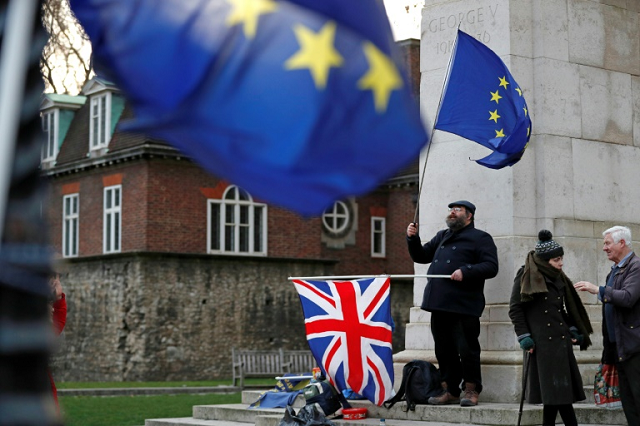Labour's Corbyn says Theresa May has not moved enough on Brexit
UK was supposed to leave EU last Friday nearly three years after it voted by 52 per cent to 48 for Brexit

PHOTO: AFP
The United Kingdom was supposed to leave the EU last Friday but, nearly three years after it voted by 52 per cent to 48 for Brexit in a referendum, it is still unclear how, when or even whether it will quit the bloc it joined in 1973.
After her EU withdrawal deal was rejected three times by lawmakers, the Conservative prime minister invited Corbyn, a veteran socialist, to talks in parliament to try to plot a way out of the crisis.
“There hasn’t been as much change as I expected,” Corbyn, 69, said. “The meeting was useful but inconclusive.”
Asked if May had accepted his preference for a post-Brexit customs union with the EU, he said: “We did have a discussion about all of that.”
Corbyn is under pressure from some in his party not to agree on a Brexit deal without ensuring that it can be confirmed or rejected in a new referendum that also offers the option to stay in the EU. He himself has said such a vote should be restricted to specific circumstances.
“I said: ‘Look, this is a policy of our party that we would want to pursue the option of a public vote to prevent crashing out or prevent leaving on a bad deal,’” he said. “There was no agreement reached on that.”
Talks will continue on Thursday.
“CONSTRUCTIVE MEETING”
A Downing Street spokesman said the meeting, which lasted an hour and 40 minutes, had been “constructive, with both sides showing flexibility and a commitment to bring the current Brexit uncertainty to a close”.
“We have agreed on a programme of work to ensure we deliver for the British people, protecting jobs and security,” he added.
May’s overture to Corbyn, whose party has 245 out of 650 lawmakers, offers a possible way for her to secure a majority for an exit deal as she seeks a second short delay to Brexit.
But some in the Labour Party have cast her gambit as a trap aimed at scaring her own lawmakers into backing the thrice-defeated deal, or as a way to extend responsibility for the difficulties of Brexit to the Labour Party.
May said on Tuesday she would seek a delay that is “as short as possible” to the current Brexit date of April 12, having repeatedly said she did not want Britain to have to take part in European Parliament elections on May 23.
But European Commission President Jean-Claude Juncker said in Brussels that Britain would not get any further short delays unless its parliament ratified a deal by April 12 - the date set by EU leaders as the effective cut-off for avoiding the European Parliament elections.
To secure a longer extension, the leaders have told May that she must present a credible way forward, and also sign up to those elections, something she is adamantly opposed to.
But Britain could ask the EU for a long Brexit delay that gives the option to leave as soon as a divorce deal is approved by parliament, finance minister Philip Hammond indicated.
If the talks with Labour fail, May will put different Brexit options for the future relationship to a vote in parliament, in the hope of finding a plan viable enough to present in Brussels.
CONSERVATIVE ANGER
May’s last-ditch approach to Corbyn, who is loathed by many of her Conservatives and mocked by May herself as unfit to govern, provoked anger in her febrile party.
Two junior ministers quit on Wednesday - one of them from the Brexit department.
“It now seems that you and your cabinet have decided that a deal - cooked up with a Marxist who has never once in his political life put British interests first - is better than ‘no- deal’,” Nigel Adams said as he resigned as a minister for Wales.
May turned to Labour after a hard core of Brexit supporters among her own Conservatives repeatedly rejected her divorce deal, saying it would leave Britain a ‘vassal state’.
Using a nickname that plays on May’s reputed robotic inflexibility, one Brexit-supporting Conservative lawmaker told Reuters: “The Maybot has gone haywire - we’ve got to find the ‘off’ switch.”
Corbyn, who voted against EU membership in a 1975 referendum, told May he wanted a customs union with the EU, access to its single market, and a guarantee of continued observance of European regulations - as a minimum on the environment, and consumer and workers’ rights.
Many supporters want the party to throw its weight behind a second referendum. But some Labour lawmakers who represent areas that voted strongly to leave the EU not only reject this but also fear that such a ‘soft’ Brexit would be seen as a betrayal.
Brexit minister Stephen Barclay said the government would accept a soft Brexit if parliament voted for it.
Britain could one day review its membership of a possible post-Brexit customs union with the European Union, Attorney General Geoffrey Cox told the BBC.
“If we decided, in some considerable years time that we wanted to review our membership of any such customs union if we signed it - and I’m not saying we will - that’s a matter for negotiation and discussion,” Cox said.



















COMMENTS
Comments are moderated and generally will be posted if they are on-topic and not abusive.
For more information, please see our Comments FAQ